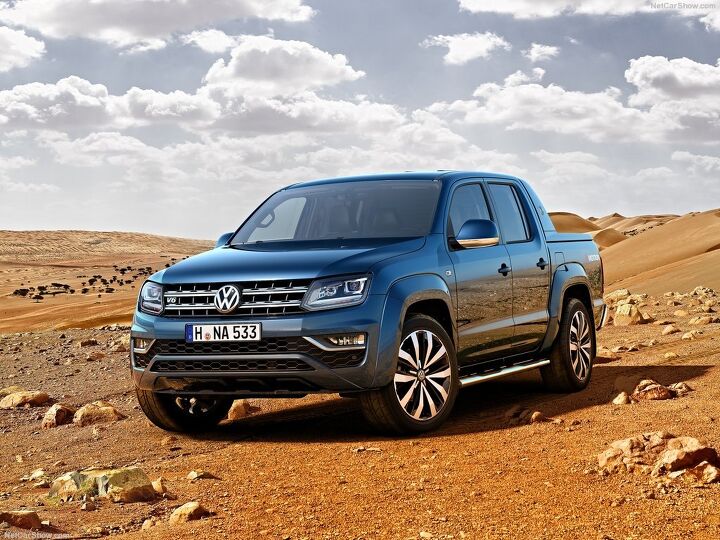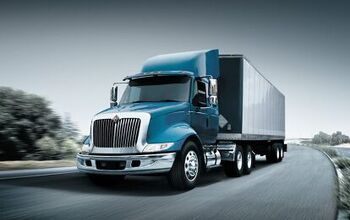Volkswagen Eyeing U.S. Van and Truck Market: Report

Move over Chevrolet, Ram and Ford?
It’s hard to say if American van and truck builders have anything to worry about after the head of Volkswagen’s commercial vehicles division publicly mused about jumping into the U.S. market.
According to Reuters, the potential for future sales has the automaker considering a stateside foray, given the booming sales of its commercial products overseas.
“Orders are at a level that some would wish for,” said Eckhard Scholz, chief executive of the automaker’s commercial vehicles division, at a German trucks show last week. He added that the U.S. is “a highly interesting market.”
Through August, Volkswagen truck and van sales rose 8.2 percent compared to the same period last year, totaling 308,500 units worldwide. Last month saw a 25 percent sales increase, with 35,500 vehicles sold.
When asked about marketing its trucks and brands in the U.S., Scholz said, “A lot of things come to mind but at the moment I have nothing concrete to say.”
Overseas, Volkswagen markets a number of vans and the recently restyled Amarok body-on-frame pickup. Bringing any of those vehicles to the U.S. would present a number of challenges, not the least of which is the dominance of other players in the market.
The company’s year-old diesel emissions scandal has stigmatized the brand. That doesn’t bode well for Volkswagen, as most of its commercial and trucks models contain diesel powerplants, including the next-generation 3.0-liter V6 TDI in the Amarok.
The automaker’s manufacturing footprint in the U.S. isn’t great, with a single assembly plant in Chattanooga, Tennessee. Nor does it have much cash to throw around, given its recent multi-billion-dollar emissions settlement with U.S. customers and regulators.
Vehicles imported from Europe would be subject to the much-loathed “chicken tax,” assuming VW doesn’t mirror Ford by installing backseats and windows in its vans (slated for removal upon arrival). U.S.-bound vehicles assembled at its Mexican plants would avoid the tax, but Volkswagen’s bean counters would need to weigh the risks. The automaker wants surefire monkey makers in its bid to turn around a U.S. sales slump.
Overseas, Volkswagen’s vans include the Golf-based Caddy van, the venerable Transporter, and the Mercedes-Benz Sprinter-based Crafter.
[Image: Volkswagen AG]

More by Steph Willems
Latest Car Reviews
Read moreLatest Product Reviews
Read moreRecent Comments
- Formula m How many Hyundai and Kia’s do not have the original engine block it left the factory with 10yrs prior?
- 1995 SC I will say that year 29 has been a little spendy on my car (Motor Mounts, Injectors and a Supercharger Service since it had to come off for the injectors, ABS Pump and the tool to cycle the valves to bleed the system, Front Calipers, rear pinion seal, transmission service with a new pan that has a drain, a gaggle of capacitors to fix the ride control module and a replacement amplifier for the stereo. Still needs an exhaust manifold gasket. The front end got serviced in year 28. On the plus side blank cassettes are increasingly easy to find so I have a solid collection of 90 minute playlists.
- MaintenanceCosts My own experiences with, well, maintenance costs:Chevy Bolt, ownership from new to 4.5 years, ~$400*Toyota Highlander Hybrid, ownership from 3.5 to 8 years, ~$2400BMW 335i Convertible, ownership from 11.5 to 13 years, ~$1200Acura Legend, ownership from 20 to 29 years, ~$11,500***Includes a new 12V battery and a set of wiper blades. In fairness, bigger bills for coolant and tire replacement are coming in year 5.**Includes replacement of all rubber parts, rebuild of entire suspension and steering system, and conversion of car to OEM 16" wheel set, among other things
- Jeff Tesla should not be allowed to call its system Full Self-Driving. Very dangerous and misleading.
- Slavuta America, the evil totalitarian police state


































Comments
Join the conversation
What Scoutdude & I are talking about regarding Navistar: there are two parts to the story. From 2003-2007, Navistar's 6-liter Powerstroke diesel engines were installed in Ford's Super Duty heavy pickups and vans, and experienced so many failures (particularly with the EGR cooler, EGR valve, oil cooler, fuel injectors and turbocharger) that Ford --- no doubt annoyed by having to pay owners in a class action lawsuit --- ultimately severed their 30-year relationship with Navistar. Also around this time, Navistar and other builders of Class 8 (18-wheeler) trucks and engines needed to decide how met 2010 federal emission standards for such rigs. Every other manufacturer studied the issue and decided to use selective catalytic reduction, or SCR, while Navistar's CEO Daniel Ustain insisted on an "advanced" EGR-only strategy. The company's engineers knew this approach was doomed, but were afraid to cross the tyrannical Ustain. The strategy failed. The company burned through all the emissions credits they had stockpiled and bought, made a failed attempt to bamboozle the EPA by labeling as 2009 models engines that were completed in 2010, and faced over a dozen class action lawsuits from buyers over repeated engine failures and frequent repairs and downtime. In 2012, the company finally canned Ustain and gave up the EGR-only strategy for Class 8 trucks. Maybe the company's leadership culture has executed a 180-degree turn in four years. But if I were a potential buyer, I'd cool it for a while to make sure.
What is it going to take to get rid of that "chicken tax"? The whole thing was a bunch of protectionist BS in the first place because the Big 3 couldn't make small trucks on their own without making them captive imports. After the Ranger/S10/Dakotas had their run the tax should have been abolished. Can't imagine there's a lot of tax being collected on it nowadays.